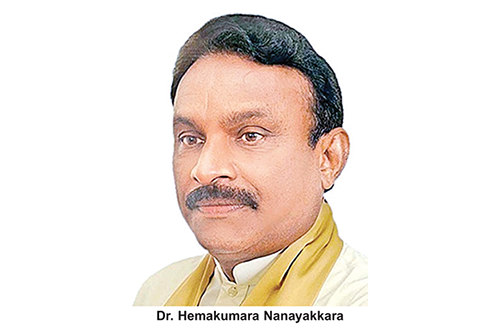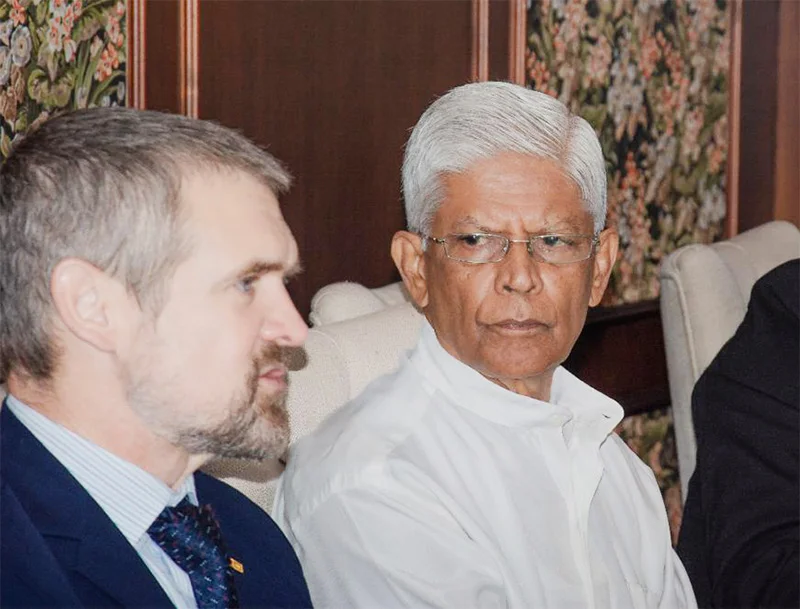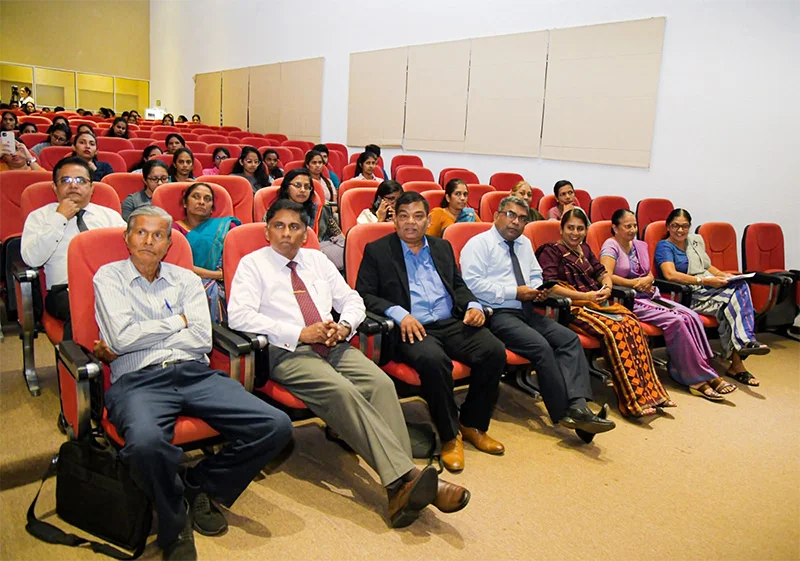Business
‘Government temporarily takes one step forward after many backward steps on agriculture’

By Dr. Hemakumara Nanayakkara
Ever since April 2021, Sri Lanka’s agriculture and plantation sectors have been beset by needless difficulties as a result of an announcement, seemingly made on a whim, that Sri Lanka would switch to completely organic agriculture – effective immediately.
In doing so, the Government has jarringly halted all progress on efforts to develop these critical sectors, pushing the entire nation back many steps in the decision to ban import and use of all agro-chemicals and inorganic fertilizer.
A conflict of intentions and egos
By issuing such an extreme proclamation without a shred of scientific analysis into how these concepts could be practically implemented in Sri Lanka, they have done more harm than good to the expansion of true organic agriculture.
This is unfortunate because, as a concept, organic agriculture has many benefits. However, unlike what has been portrayed, it is not simply a matter of reverting to ‘ancient practices’. There is a deep and complex science to organic cultivation.
None of these complexities were understood or considered when the imprudent decision to ban all inorganic inputs was first announced. The assumption that ‘organic’ is just adding compost to soil has been the detriment of the directive. Hence, it was decided that imported chemical inputs were not necessary, not because organic agriculture is practical, but because imports require the Government to spend more of the nation’s now dwindling foreign reserves.
A little knowledge is a dangerous thing
In the months that have followed, everyone from academics to industry experts and farmers on the ground have been venting their frustration at the total breakdown of their regular cultivation practices as a result of this dangerously unscientific approach to agricultural reform.
After much condemnation, it was finally announced at the start of August that the Government was reverting their position. While not admitting it and maintaining that the ban is still in effect, probably to save face, the fact that they are relenting on import of chelated minerals, fertilizer mixes and micro-nutrients for specialist applications including for hydroponic cultivation and floriculture”, even if temporary, is a slight relief.
It may be assumed that technicalities of what these terms mean may be enough to dissuade the public from asking too many questions. But anyone with passing knowledge of agriculture would understand that chelated minerals and fertilizer mixes contain the exact same inorganic inputs which the Government is overtly claiming to ban – namely: Nitrogen, Phosphorus, and Potassium (NPK). These are the elements which are essential to plant nutrition and growth.
Prior to the invention of techniques to produce synthetic fertilizer in the early 1900s, guano – the accumulated excrement of seabirds and bats was the only known reliable source of fertilizer with NPK suitable for commercial agriculture at that time. This pressing demand for fertilizer led to many predictions of mass starvation, and it would have come to pass were it not for the invention of the Haber-Bosch technique for the manufacture of synthetic nitrogenous fertilizer.
While it is possible to obtain Phosphorus locally, and organic Potassium could be imported from natural mines – leaving aside the fact that supply chains are not in place to meet the entire national requirement – sourcing Nitrogen is much more problematic. That is because it is extremely difficult to obtain N from plant or animal sources at the levels necessary for commercial scale agriculture.
Currently, we use Urea for tea and paddy, which contains approximately 46% Nitrogen. By contrast, organic sources like Gliricidia offers only 4%, while cattle dung has 3.5% and poultry dung –with 4.5% nitrogen by composition.
Prior to the ban, NPK was used in paddy, tea, rubber and coconut, and after the latest relaxation, these are still the same inputs that are being used, so in practice the Government has taken 3 months to make a bad decision and then reverse it – all the while falsely maintaining that inorganic NPK is not acceptable.
Had the Government simply consulted with relevant experts in the field in an open and transparent manner, they could have avoided all of the detrimental effects which followed from this disastrous decision. While there mention of a “Presidential Task Force for a green socio-economy” at the outset, they have not been forthcoming about their logic or approach in any public forums.
We are aware that there is a person in that task force who has been presented as a professor who made the ludicrous claim that sea-weeds as tall as coconut trees can be harvested from the ocean and used as organic fertilizer. While it is true that such large seaweed growth does exist, it is only found in close proximity to the North Pole, hence it is of no relevance to Sri Lanka. We offer this example in order to shine a light on the absurd and utter lack of credible scientific information behind policy decisions at the highest levels of this Government.
Those who fail to learn from history are doomed to repeat it
If we continue to allow the State to intervene and interfere with the fundamentals of agriculture in Sri Lanka based on the whims of such individuals, what is the worst that could happen? Previously we were told that the import and use of all agrochemicals would be banned immediately. Thereafter, the deadline was pushed back to a period within 3 months – 1 cultivation season. Now they have temporarily reverted back to allowing agro-chemicals, but it is implied that these imports could once again be banned at any moment.
In the interim, the solution that is currently being offered is a “nitrogen extract” that will be used as a spray. No further details have been provided. We don’t know if this extract is organic, inorganic, from the moon or even Mars. All we do know is that the only possible high percentage nitrogenous extracts can only be obtained from a chemical base. If the Government is trying to deceive people, they may use chemically extracted nitrogen, which could in turn be sprayed on organic manure and distributed among farmers.
In effect, the Government is refusing to reveal what exactly we will be adding to our soil through such extracts. Until they do, we must continue to call for more clarity and transparency. This is especially crucial for any agricultural exports – especially tea – whose buyers are sensitive to Maximum Residue Limits (MRLs).
Another fact to consider: no country in the world has ever succeeded in going totally organic. There are however some cautionary examples from history of those who tried. The example of Bhutan has been often cited in recent months. There, it was announced that over a period of 20 years, Bhutan would systematically phase out inorganic inputs. Even after careful and intensive planning with broad stakeholder consultation and preparation, the country was only able to convert 10% of their arable lands into organic agriculture after 30 years of effort in total.
The author is a former State Minister of Agriculture, Former Governor of the Southern Province, and Sri Lanka’s only PhD in Organic Agriculture from the Post-Graduate Institute of Agriculture at the Peradeniya University
To be continued
Business
How middle powers cooperate to achieve shared goals

‘Australia’s engagement with institutions, such as the Indian Ocean Rim Association (IORA) and “minilateral” platforms, including the Quad and the Combined Maritime Force, are practical examples of middle powers working together to address shared challenges ranging from ocean piracy to humanitarian assistance, Australia High Commissioner to Sri Lanka Matthew Duckworth said at a recent round table forum featuring the media and other important sections, held at the Colombo Club of the Taj Samudra Hotel on the topic ‘Middle Power Diplomacy.’
The forum was organized and conducted by the Pathfinder Foundation of Sri Lanka under the moderation of the latter’s Chairman, Ambassador (Rtd.) Dr. Bernard Goonathilake.
High Commissioner Duckworth underscored that such cooperation is not directed against any particular country but aims to preserve an open, inclusive, and rules-based regional order.
H.C. Duckworth acknowledged the reality of major power competition while stressing that Australia seeks stable and respectful relations with all countries, including Sri Lanka, cooperating where possible and disagreeing where necessary, without compromising core national interests.
Further, the H.C. focused on India’s evolving role in the Indian Ocean, the trajectory of China’s rise, the durability of the current global order, alliance dynamics, and Sri Lanka’s positioning in the Indian Ocean.
Responding to a question about India, the High Commissioner affirmed that Australia expects all major powers—India, China, and the United States—to act transparently and to respect the sovereignty of smaller states. On whether the current emphasis on middle-power diplomacy is a temporary shift or a long-term trend, the High Commissioner stated that middle powers must now play a more visible and proactive role in sustaining international norms and institutions.
H.C. Duckworth added that Australia invests in Sri Lanka in sectors, such as, minerals, renewable energy, textiles and education services. The High Commissioner reiterated Australia’s support for open trade and deeper regional economic integration, emphasizing the importance of economic resilience in a contested global environment.
The Pathfinder Foundation is a Colombo-based think tank dedicated to fostering informed dialogue on foreign policy, economic development and strategic affairs.
By Hiran H Senewiratne
Business
Green Minds: A new platform to rethink environmental governance in Sri Lanka

The Ministry of Environment yesterday launched a new knowledge-sharing platform titled Green Minds, aimed at strengthening environmental thinking and institutional capacity among public sector officials, at a time when Sri Lanka is facing mounting ecological stress and climate-related challenges.
The inaugural session of the monthly programme was held on February 12, 2026, at the Ministry auditorium under the patronage of Secretary to the Ministry of Environment, K. R. Uduwawala, with the participation of senior officials from the Ministry and its affiliated institutions.
Addressing the gathering, Secretary Uduwawala said that Green Minds was designed not merely as another training initiative, but as a thinking space for public officials to critically engage with emerging environmental concepts and global best practices.
“Environmental governance today is no longer limited to regulations and enforcement. It requires new ways of thinking, interdisciplinary approaches and continuous learning. Green Minds is intended to become a platform where officials can reflect, debate and update themselves on these evolving realities,” Uduwawala said.
He stressed that Sri Lanka’s environmental institutions must move beyond routine administrative practices and embrace knowledge-driven policy making, particularly in areas such as climate adaptation, biodiversity conservation, sustainable resource management and environmental justice.
The keynote lecture at the inaugural session was delivered by Senior Professor Siri Hettige, who spoke on the role of social sciences in achieving sustainable development in Sri Lanka. He highlighted the often overlooked social dimensions of environmental problems.
“Environmental issues are not purely scientific or technical. They are deeply social. Human behaviour, consumption patterns, inequality and governance structures all shape environmental outcomes,” Prof. Hettige said.
“If we want sustainability, we must understand society as much as we understand nature.”
He pointed out that many environmental policies fail because they do not adequately consider community realities, livelihoods and social power relations.
“You cannot conserve forests without understanding people. You cannot manage waste without understanding urban lifestyles. Sustainability is fundamentally a social project,” he added.
Following the keynote, a high-level panel discussion on strengthening environmental awareness brought together Prof. Hettige, Dr. Herath Vidyaratne, environmental policy analyst, Ravindra Kariyawasam, Adviser to the Minister of Environment, and S. C. Palamakumbura, Conservator General of Forests.
Kariyawasam said Sri Lanka was at a critical juncture where environmental decision making must be aligned with national development priorities.
“We can no longer treat the environment as a separate sector. It has to be integrated into economic planning, infrastructure development and social policy. Green Minds offers a space for officials to think beyond institutional silos,” he said.
Dr. Vidyaratne stressed that environmental literacy among state officials was essential in responding to complex challenges such as climate change, water scarcity and ecosystem degradation.
“The problems we face today are interconnected. Climate change is linked to food security, public health and migration. Officers need systems thinking, not just subject knowledge,” he said.
Meanwhile, Palamakumbura highlighted the importance of translating environmental awareness into institutional action.
“We have knowledge, laws and policies. What we need is consistent implementation and a shared environmental ethic across all institutions. Platforms like Green Minds can help build that collective responsibility,” he said.
He noted that forest conservation, wildlife protection and ecosystem restoration could not succeed without inter-agency cooperation and informed decision makers.
By Ifham Nizam
Business
Third quarter financials highlight 30% PBT growth for Aitken Spence in FY 2025/26

Spanning tourism, maritime and freight logistics, strategic investments and services, with operations across the region, Aitken Spence PLC, with a legacy of over 157 years, continues to pursue excellence. The Group recorded revenue of Rs. 67 billion for the nine months ending 31st December 2025, underscoring a robust performance across its portfolio of industries. The Tourism sector accounted for 68% of Group revenue, while the Maritime & Freight Logistics sector and Strategic Investments sector contributed 18% and 12% respectively. Furthermore, the Group’s revenue for the third quarter improved by 3.8%, reflecting steady performance across key sectors.
The Group’s total Profit Before Tax (PBT) stood at Rs. 5.6 billion for the nine months ending 31st December 2025, compared to Rs. 4.3 billion in the corresponding period of the previous year, reflecting a growth of 30%. Correspondingly, the Group’s Profit After Tax improved by 42% to reach Rs. 3.4 billion.
Sectoral Performance
The Tourism sector recorded the most notable improvement during the period under review, reporting a Profit Before Tax (PBT) of Rs. 2.0 billion for the nine months ended December 2025. This performance was primarily attributable to the sustained recovery and growth of the tourism industry in Sri Lanka. In addition, the sector benefited from significant improvements in profitability at the Group’s Maldivian resorts, as well as enhanced operating performance across hotel operations in India and Oman.
The Group’s Maritime & Freight Logistics sector was the largest contributor to Profit Before Tax for the period under review, reporting a Profit Before Tax of Rs. 3.3 billion. Sector performance, however, was moderated by lower volumes and margin pressures, particularly impacting overseas freight and airline operations. This was reflected in the reduced contribution from the sector’s equity-accounted investee for the period.
In the Strategic Investments sector, the key contributing segments of printing and plantations both recorded stellar performance for the period under review despite the challenging market conditions of these industries, while the power generation segment witnessed a steady performance with notable contributions from the Waste-to-Energy and renewable power generation operations. However, the significant losses incurred in the apparel manufacturing segment impacted the overall performance of the sector, resulting in a loss of Rs. 652 million at PBT level.
The Services sector recorded strong growth during the period under review, driven primarily by the expansion of operations at Port City BPO, the Group’s most recent investment. This performance was further supported by improvements in performance by the Group’s elevators segment. As a result, the Services sector reported a Profit Before Tax of Rs. 843 million, compared to Rs. 114 million in the corresponding period of the previous year.
The period was marked by notable achievements:
Aitken Spence PLC became the first and only diversified holdings company in Sri Lanka to have its climate targets validated by the Science Based Targets Initiative (SBTi).
-

 Life style3 days ago
Life style3 days agoMarriot new GM Suranga
-

 Business2 days ago
Business2 days agoMinistry of Brands to launch Sri Lanka’s first off-price retail destination
-

 Features3 days ago
Features3 days agoMonks’ march, in America and Sri Lanka
-

 Midweek Review7 days ago
Midweek Review7 days agoA question of national pride
-

 Business7 days ago
Business7 days agoAutodoc 360 relocates to reinforce commitment to premium auto care
-

 Opinion6 days ago
Opinion6 days agoWill computers ever be intelligent?
-

 Features3 days ago
Features3 days agoThe Rise of Takaichi
-

 Features3 days ago
Features3 days agoWetlands of Sri Lanka:













